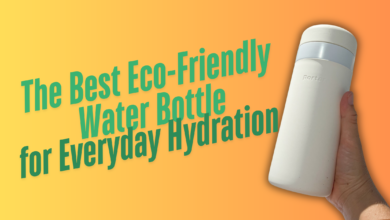Choosing Between Fast, Stable, and Affordable: The Trade-Offs in Internet Services
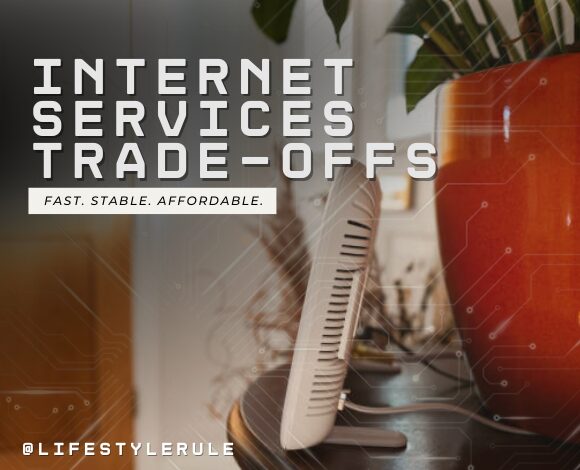
Internet connectivity in the Netherlands has become more vital than ever. From working remotely and attending virtual classes to streaming entertainment and powering smart homes, the need for strong, consistent access continues to grow. As digital lifestyles evolve, so do expectations. People want fast downloads, smooth video calls, and plans that are both reliable and reasonably priced. Yet finding a provider that delivers all three without compromise remains difficult.
Each Internet Service Provider in the Dutch market takes a different approach to solving this equation. Some focus on expanding fiber networks, others emphasize bundled services, while a few compete primarily on price. These differences result in trade-offs that can impact daily use, especially depending on where you live and how much you rely on your connection. Understanding these distinctions is key to choosing a provider that fits your needs without overpromising or underdelivering.
What Makes a Reliable Internet Service?
A reliable connection is not just about speed. It depends on the type of technology used, how consistent the service is during peak usage, and how clear and flexible the pricing structure is. Each of these aspects influences what you actually get out of your plan on a daily basis.
Speed and Network Infrastructure
The type of connection a provider uses has a direct effect on the quality of your internet. In the Netherlands, the main technologies are fiber, cable, and DSL.
- Fiber-optic offers the fastest and most stable performance, with equal upload and download speeds.
- Cable provides high download speeds but typically lower upload speeds. It may be affected by congestion in busy neighborhoods.
- DSL is delivered over telephone lines and is generally the slowest, with limited upload capacity and performance that depends on your distance from the exchange.
Fiber is expanding across the country, but availability still varies by region. Understanding which technology is used at your address is the first step toward choosing a provider.
Stability and Performance Under Load
Reliable internet means more than a high speed number on paper. It’s about how the connection performs throughout the day, especially when multiple people are online or during peak hours.
- Uptime reflects how often the connection is available without interruption.
- Low latency ensures quick responses, which is essential for video calls, gaming, and real-time tools.
- Consistent speeds help avoid sudden buffering or delays, even when the network is under pressure.
A stable connection is critical for anyone working from home, using cloud services, or streaming on multiple devices.
Affordability and Plan Structure
Internet pricing often looks simple at first glance, but there are many details that affect what you actually pay and what you receive in return.
- Contract length may range from monthly rolling terms to fixed one- or two-year deals with penalties for early exit.
- Modem rental, activation fees, or hidden service charges can increase your real monthly cost.
- Add-on options like television packages, mobile plans, or premium support may offer better value when bundled, or simply inflate the price unnecessarily.
Understanding the structure behind the pricing is just as important as the speed you’re paying for. Look closely at what’s included, what’s optional, and what you may be locked into over time.
Now that the fundamentals are clear, it’s time to look at how each major provider applies them in practice. The Dutch market features a mix of national players and regional specialists, each with their own strengths, trade-offs, and priorities. Understanding their differences begins with a closer look at what they actually offer.
1. Ziggo – Cable Giant with Entertainment-Focused Bundling
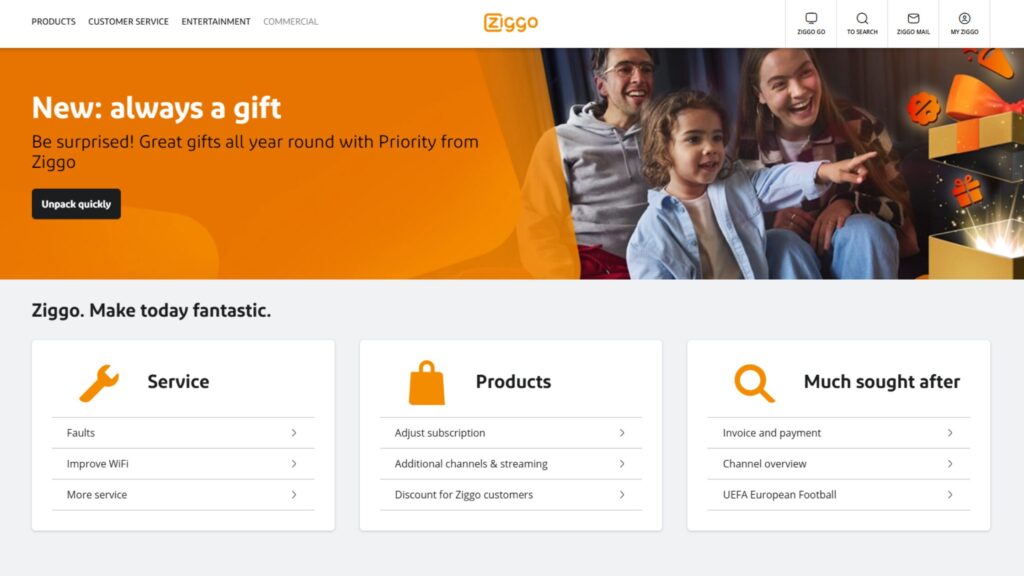
Ziggo is one of the most recognized internet providers in the Netherlands, known for its extensive coverage and multimedia-oriented service approach. Through its hybrid fiber-coaxial network, Ziggo delivers fast, stable internet to millions of homes, while offering bundled solutions that combine television, mobile, and online security in one account.
As part of the VodafoneZiggo partnership, the brand focuses on providing users with a full-service digital experience built around convenience and high-speed access.
Infrastructure and Speed Delivery
Ziggo’s network architecture is predominantly hybrid, combining fiber-optic backbones with coaxial cables for the final connection to homes. Approximately 97 percent of the data transmission path utilizes fiber, with the remaining 3 percent—often referred to as the “last mile”—delivered via coaxial cables. This hybrid setup ensures wide coverage and fast speeds, particularly in urban and suburban areas.
The company has implemented DOCSIS 3.1 technology on its coaxial segments, enabling download speeds of up to 1 Gbps. This technology also lays the groundwork for future upgrades, with potential speeds reaching up to 10 Gbps. The current internet packages available from Ziggo include:
- Wifi Start: 100 Mbps download / 25 Mbps upload
- Wifi Middel: 400 Mbps download / 40 Mbps upload
- Wifi Groot: 1000 Mbps download / 100 Mbps upload
These speed tiers accommodate a variety of digital habits, from casual browsing to high-demand usage like 4K streaming, large file transfers, and online gaming.
Bundles and Dual-Service Strategy
As part of VodafoneZiggo, Ziggo offers integrated bundles that combine internet, television, and mobile into one monthly plan. These packages are designed to deliver both convenience and added value.
- Bundling benefits: Customers who combine Ziggo and Vodafone receive discounts and bonus content
- Entertainment options: Packages may include Ziggo Sport, Movies & Series XL, and Safe Online XL security
- Flexible configurations: Subscribers can tailor their plans to match different household sizes and usage habits
- Simplified management: The integration streamlines billing, service setup, and account administration
This combined-service model is especially attractive to those who want reliable internet paired with television and mobile services under one account. It allows for centralized support, consistent service standards, and enhanced entertainment options through one provider.
Network Features and Customer Experience
Ziggo’s internet service includes a range of customer-focused features designed to enhance usability and support. Subscribers can choose between professional installation or a convenient self-install kit, depending on their preference.
The Ziggo Wifi Assistant app helps optimize wireless coverage throughout the home, while account management is simplified through a central online dashboard. Additional services such as Ziggo GO give users the flexibility to stream live television on multiple devices. Together, these tools and extras complement Ziggo’s strong network availability and make it a practical choice for households that rely heavily on connected living.
2. Odido – Modernized Identity Backed by Fiber Growth
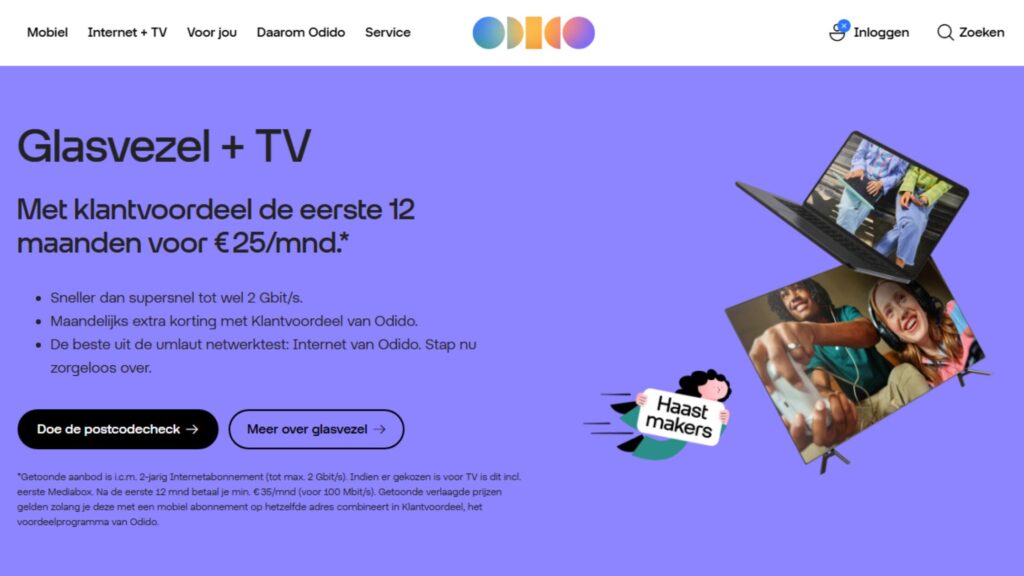
Odido, formerly T-Mobile Netherlands, has redefined its presence in the Dutch telecommunications market with a strong focus on fiber expansion, customer-centric services, and a modern brand identity. This transformation emphasizes simplicity, flexibility, and a commitment to meeting the evolving needs of consumers.
Fiber Ambitions and Coverage Expansion
Odido is rapidly expanding its fiber-optic network through strategic partnerships, notably with Open Dutch Fiber (ODF). ODF’s open-access infrastructure allows Odido to offer high-speed fiber services to a growing number of households across the Netherlands. ODF has already connected over 600,000 homes and aims to reach more than 2 million by 2025.
Odido’s fiber offerings include:
- High-speed internet: Plans offering speeds up to 8 Gbps, catering to heavy internet users and households with multiple devices
- Flexible installation: Options for self-installation or professional setup, ensuring a smooth transition to fiber services
- Wide availability: Services accessible in numerous urban and suburban areas, with ongoing expansion efforts
This aggressive fiber rollout positions Odido as a leading provider of next-generation internet services in the Netherlands.
Flexible Contracts and Simplified Offers
Odido prioritizes transparency and customer convenience in its service offerings. Key aspects include:
- Transparent pricing: Clear and straightforward pricing structures without hidden fees
- Flexible contracts: Options for monthly or annual plans, allowing customers to choose what best fits their needs
- Digital-first experience: User-friendly online platforms for account management, billing, and support
These features reflect Odido’s commitment to providing a hassle-free and customer-friendly service experience.
Market Positioning Post-Rebrand
The transition from T-Mobile Netherlands to Odido marks a significant shift in brand strategy. Launched in September 2023, the rebranding effort involved:
- Unified branding: Consolidation of T-Mobile and Tele2 services under the Odido name, streamlining the brand portfolio
- Customer-centric focus: Emphasis on humanizing technology and enhancing customer experiences
- Innovation and sustainability: Commitment to sustainable practices and the introduction of innovative services, such as 5G fixed-wireless access solutions
Odido’s rebranding reflects its dedication to adapting to market trends and prioritizing customer needs in the rapidly evolving telecommunications landscape.
3. Online.nl – Budget ISP with a Back-to-Basics Model
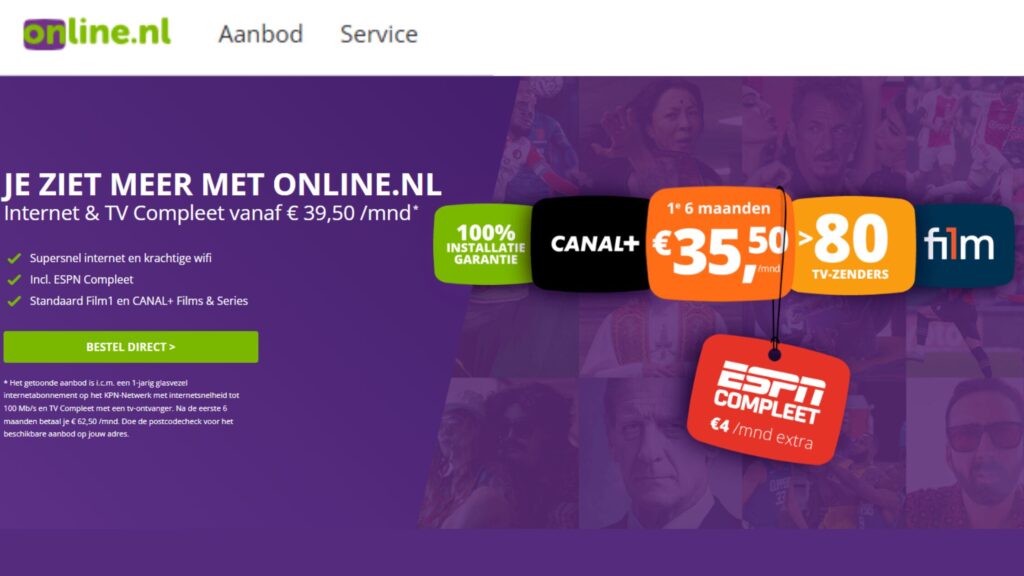
Online.nl targets users who value simplicity and affordability in their internet services. Unlike providers that focus on bundling or high-speed fiber rollouts, Online.nl emphasizes basic connectivity through DSL and a minimalistic service model. It’s especially suited to individuals or households with light internet usage who prefer predictable pricing over premium features.
DSL Technology and Its Limitations
Online.nl operates primarily on DSL connections, which rely on legacy copper infrastructure managed by KPN. This means internet is delivered through standard telephone lines rather than modern fiber-optic cables. As a result, Online.nl’s plans typically support:
- Download speeds up to 100 Mbps depending on line quality and distance from the central exchange
- Upload speeds that may be limited, often topping out at 10–30 Mbps
- Lower latency performance, which can affect video calls, gaming, or high-definition streaming
While DSL is sufficient for everyday browsing, emails, and moderate streaming, it doesn’t match the speed or scalability of fiber or DOCSIS cable technologies used by other ISPs. For users with higher demands, the performance ceiling of DSL may become restrictive.
Simple Pricing for Light Users
Online.nl’s core appeal lies in its straightforward pricing model. The company offers just a few internet-only plans that skip premium add-ons and bundled perks. This makes it ideal for:
- Budget-conscious individuals, including students or retirees
- Households with basic internet needs such as web browsing and emails
- People who prefer stable monthly rates without unexpected add-on charges
Since the service is lean by design, customers are not paying for features they won’t use. That simplicity ensures long-term affordability with clear expectations.
Minimalist Approach to Service and Add-ons
Compared to major ISPs, Online.nl intentionally avoids offering a wide variety of extras or entertainment bundles. There is minimal integration with mobile services, TV platforms, or advanced hardware setups. This approach includes:
- No extensive partnerships for multi-service bundles
- Standard Wi-Fi routers without premium mesh systems
- Customer support focused on essential troubleshooting
While this model may not suit users looking for full ecosystem integration or advanced parental controls, it provides a clean and distraction-free option for those who simply want basic home internet at a low price. Online.nl keeps things accessible and manageable — a key advantage for those who prioritize cost over complexity.
4. TriNed – Regional Fiber Specialist with Modular Plan Options
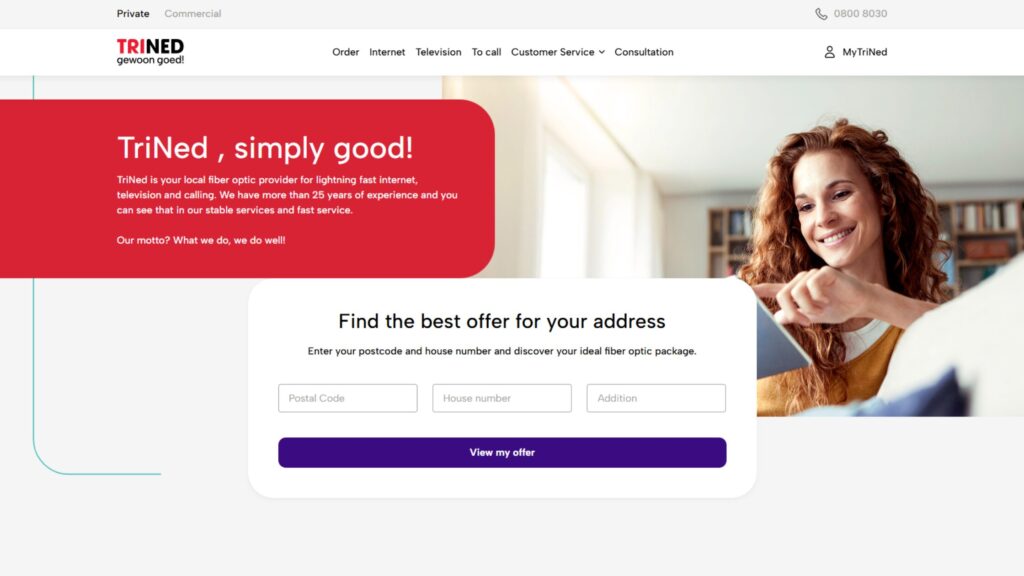
TriNed is a well-established Dutch internet provider known for operating on open-access fiber networks, especially in rural and newly developed areas. While not as prominent as national players, it has built a solid reputation for customer choice, clarity, and regional focus. TriNed’s appeal lies in its ability to let users configure their own internet experience — from speed levels to service combinations — making it a strong fit for households that want only what they need, without paying for extras they do not use.
Open Fiber Network Accessibility
TriNed operates primarily on open fiber networks across the Netherlands, including those developed by Delta Fiber, E-Fiber, and Glasvezel buitenaf. These partnerships allow the company to extend high-speed internet into areas where large national ISPs may have limited infrastructure.
- Geographic strength: Active in rural municipalities, small towns, and expanding suburbs
- Rollout dependency: Availability depends on local fiber activation schedules and installation zones
- Coverage tools: Users can check real-time service eligibility by address during checkout
By focusing on these networks, TriNed plays an important role in closing the digital gap between urban centers and outlying regions, particularly in provinces like North Brabant, Drenthe, and Gelderland.
Choose-Your-Own-Services Model
TriNed’s standout feature is its fully modular ordering process. Customers can build their internet package from scratch, selecting only the components they truly want.
- Plan flexibility: Options include internet-only, internet plus TV, or a full triple play (internet, TV, and VoIP phone)
- Add-on options: Users can add premium Wi-Fi routers, extra TV packages, or fixed telephone service based on need
- User interface: TriNed’s checkout tool visually guides customers through plan building, price breakdowns, and hardware choices
This a la carte style makes TriNed attractive to minimalists, budget-conscious families, or rural professionals who don’t want one-size-fits-all bundles.
Stable Speeds and Clear Contracts
TriNed offers dependable fiber speeds that range from 100 Mbps to as high as 1 Gbps, depending on what the local infrastructure supports. Higher speeds are available in areas with newer fiber rollouts, and users can often upgrade tiers without changing providers.
- Speed tiers: Common options include 100 Mbps, 500 Mbps, and 1000 Mbps (1 Gbps)
- Transparent pricing: Activation costs are disclosed upfront, with no hidden setup or cancellation fees
- Contract terms: Users can typically choose between monthly flexibility or 1-year fixed contracts
Installations are coordinated with local fiber network readiness. In areas where fiber has recently been installed, TriNed provides users with updates on scheduling and availability. The company’s support is primarily digital, but customers can reach out by phone for assistance with planning, billing, or technical help.
5. Solcon – Value-Driven ISP with a Focus on Family and Safety
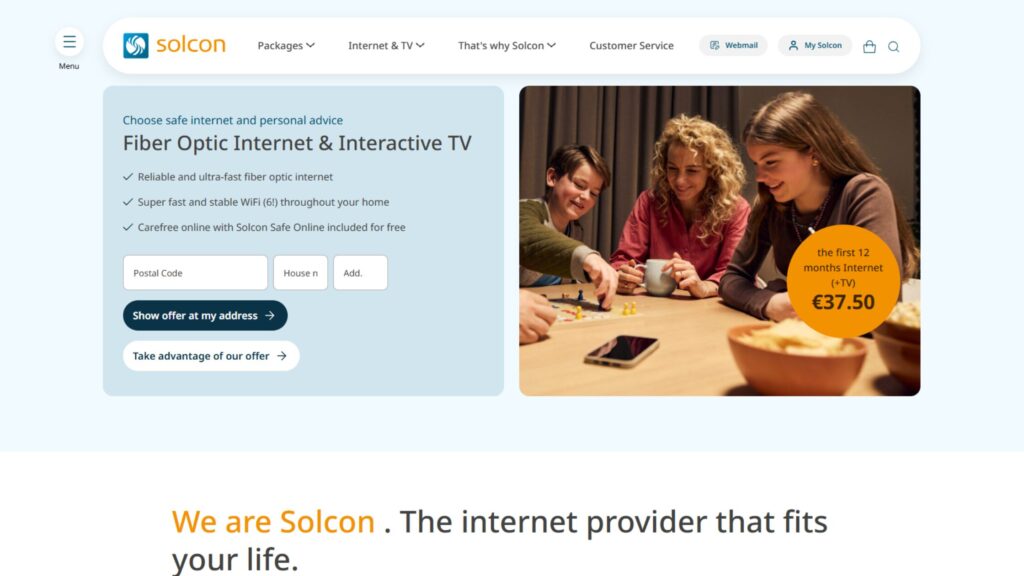
Solcon is a Dutch internet service provider that emphasizes online safety, family-friendly features, and ethical internet usage. As a subsidiary of KPN, Solcon leverages a robust infrastructure to deliver reliable services, particularly appealing to households, educational institutions, and users seeking a controlled online environment.
Built-In Filtering and Parental Tools
Solcon offers advanced parental control and content filtering options to ensure a secure internet experience:
- Solcon Veilig Online: Included free with internet subscriptions, this security suite—based on F-Secure technology—provides antivirus protection, safe browsing, and parental controls. It covers up to five devices, with options to expand coverage.
- ISA® Multimediafilter: Available for €2.95 per month, this filter allows users to:
- Block specific content categories and websites
- Set internet access schedules for children
- Implement HTTPS filtering to monitor secure websites
- Customize profiles per device for tailored restrictions
These tools are particularly beneficial for families aiming to manage their children’s internet usage effectively.
Internet with Values-Based Customization
Solcon distinguishes itself by offering internet services aligned with specific user values:
- Faith-Based Filtering: Options to restrict access to content conflicting with religious or ethical beliefs.
- Ad-Free Browsing: Settings to minimize exposure to advertisements and tracking.
- Customized Packages: Ability to tailor services to individual preferences, ensuring users receive only the features they desire.
This approach caters to users seeking an internet experience that aligns with their personal or organizational principles.
Moderate Speeds with High Service Reliability
Solcon provides both DSL and fiber-optic internet services, depending on location:
- Speed Options: Packages range from 100 Mbps to 1 Gbps, accommodating various household needs.
- Network Infrastructure: Utilizes KPN’s extensive network to ensure broad coverage and stable connections.
- Customer Support: Known for responsive and personalized customer service, assisting users with technical support and service customization.
Solcon’s commitment to reliability and customer satisfaction makes it a viable option for users prioritizing service quality over ultra-high-speed offerings.
How Market Competition Shapes Service Quality
The Dutch internet market is defined by a dynamic interplay between infrastructure providers, consumer expectations, and regulatory standards. Understanding how competition affects service delivery helps contextualize the trade-offs among ISPs operating across the Netherlands.
Urban vs Rural Disparity
The availability and quality of internet services can differ significantly based on geographic location:
| Area | Urban | Rural | Bridging the Gap |
|---|---|---|---|
| Access | Multiple ISPs, high competition, fast speeds | Few providers, legacy DSL, slower speeds | Regional fiber initiatives improving local availability |
| Network | Cable and fiber widely available | Mostly DSL or selective fiber | Regional fiber rollouts fill coverage gaps |
| Benefits | Bundles, promos, rapid upgrades | Basic plans, limited extras | Modern features for non-urban households |
Commercial Pressure and Service Investment
While competition generally benefits consumers, it can also present challenges for providers:
- Innovation pressure: ISPs must continually enhance features, speeds, and customer experience to maintain relevance.
- Aggressive pricing: Low-cost plans attract customers but can squeeze margins, sometimes limiting investments in support or infrastructure.
- Value balancing: Providers must carefully balance cost-effectiveness with long-term reliability and service quality.
The Shifting Expectations of Dutch Internet Consumers
Dutch households are increasingly assertive in choosing providers that match not just their technical needs but also their lifestyle values. This shift is reshaping how ISPs market and structure their offerings.
Rise of Short-Term Contracts and Freedom to Switch
The traditional long-term contract model is losing appeal:
- Flexibility: More consumers demand the ability to adjust or cancel services without penalties.
- Market responsiveness: ISPs now offer monthly plans, seasonal promos, or reduced commitment durations to win over hesitant buyers.
- Portability: Customers want services that adapt quickly to home moves or changing family setups.
Integration with Smart Devices and Digital Life
With the rise of smart homes, the internet is now at the heart of domestic ecosystems:
- Device sync: Homes are increasingly filled with IoT devices like smart lights, thermostats, and speakers.
- Bandwidth demand: These devices require low-latency, stable connections to function seamlessly.
- ISP response: Providers are investing in mesh Wi-Fi, app-based controls, and diagnostics tools to meet these evolving needs.
Transparency and Trust in Service Models
Today’s consumers are more cautious and informed, placing greater value on transparency and trust in service models. Clear pricing is essential, as hidden fees and complicated contracts are widely viewed as red flags. Effective communication also plays a major role. Prompt and honest customer support helps build long-term loyalty. Additionally, providers that demonstrate strong values and a clear mission tend to resonate with users who care about more than just performance or cost.
Conclusion – Choosing with Context, Not Just Specs
The Dutch internet market is evolving quickly, shaped by competition, infrastructure investments, and changing consumer expectations. Choosing a provider today is less about chasing maximum speed and more about matching service conditions with real-life usage.
Before committing, it is worth considering how your location, lifestyle, and digital demands intersect with what is realistically available. A thoughtful decision comes from aligning personal needs with long-term value, not just advertised performance. In a market full of technical claims, clarity and context are what ultimately shape a satisfying experience.
